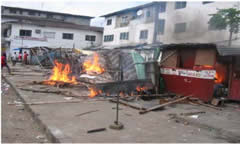
The LIHEDE Greensboro Meeting: Liberians Want a National Conference
By Abdoulaye W. Dukulé
Adukule@theperspective.org
The Perspective
Atlanta, Georgia
November 9, 2004
Under the general theme of "Promoting Civil Liberties, Collective Security and Development in Post-Conflict Liberia," LIHEDE’s two-day conference brought together some of what Dr. Syrulwa Somah, Executive Director of LIHEDE, described as the "brightest minds of Liberia" to discuss a variety of issues in a communication to the organizers. Along with students and faculty of the two institutions that sponsored the conference, the North Carolina Agricultural and Technical State University and Bennett college of Greensboro, at least a dozen US-based Liberian community and professional associations participated in the debate. Among them, the Liberian Associations of Charlotte, Durham, Greensboro, the Liberian Institute for Peace, Democracy and Good Governance, the Union of Liberian Associations in the Americas (ULAA), the Metro Council of Negro Women, the Sinoe County Association, UNIBOA, UNICCO as well as the Sunday Group, an NGO on Mental Health and the Association of Liberian Journalists in America (ALJA), presented positions papers and participated in a high spirited debate on mapping a forward road for Liberia. In the midst of the great intellectual discussions aimed at finding a new path for Liberia, news of another round of senseless violence with images of the burning city of Monrovia cast a dark shadows on the deliberations. Throughout the conference, many reached for their cell phones to call "home" for the latest news to share with others in the audience. The new president of the ULAA, Mr. Arthur Watson, asked attendants to observe a minute of silence in memory of those who died during the fighting and looting. As it happened many times in recent years, Liberians had gathered to talk about strategies for development and healing in their country after 24 years of military instability. However, the events at home reminded the gathering of the big gap between wishful thinking and the reality: Liberia was far from post-conflict era, it was still stranded in violence and hatred. Monrovia with its million of hungry, angry and dispossessed people was a time bomb, like a social volcano that could explode at anytime. Hundreds of thousands of mostly unemployed youth were waiting for any occasion to loot and burn. Speakers at the conference presented great papers,
some academic some dealing with practical issues.
Dr. Cyril Broderick spoke about agriculture and told
the audience that peace and agriculture go hand in
hand and that Liberia must emphasize agriculture as
the path to development and stability. Mrs. Mia Quipu
Yuan, an agronomist, spoke on "Women & Small
Business Development in Post-Conflict Liberia. Dr.
Emmanuel Dolo discussed Mental Health and Social Rehabilitation,
stressing the need for every Liberian, victim or perpetrator
of the years of violence to have some type of mental
health assistance and how the build institutions dealing
with the problem. Mrs. Madea Reeves-Karpeh, a former
president of ULAA spoke at length on the role of women
in post-conflict Liberia and drew much applause from
the audience. Lt. J. Kessel Tarley, a Liberian in
the US military presented a paper on the reorganization
of the Liberian military and pinpointed the weaknesses
of the past military culture of the country. His topic
prompted a lengthy discussion on the role of the military
in the new Liberia. During the two days of discussion and brainstorming, Liberians and others academics and friends of Liberia discussed various topics, all related to putting the nation on track and healing the wounds. "Cultural Diversity and National Unity," "Local and Foreign Policy," Press Freedom and Civil Liberties." "Health and Services and Rehabilitation," "National Security and Public Safety," and "National Development and Strategic Planning" constituted the main topics, with various speakers unveiled theoretical approaches to putting the pieces of Liberia back together. Near the end of the second day, the last and main topic for many was the issue of a national conference of Liberians in Diaspora to take place prior to another such conference held in Monrovia. This was an outstanding topic from the July 2004 symposium organized by the embassy of Liberia in Washington, DC. At the end of that meeting, participants agreed to continue consultations with a view of calling for a general conference of US-based Liberians and Liberian organizations. Although there was a consensus on the holding of such of forum, the sticking problem has been that of agreeing as to who would convene the forum. After the symposium organized by the embassy, another one-day conference was held in Baltimore and the same issue caused a rift between various groups who wanted to convene the meeting. In Greensboro, with the urgency of the situation at home, advocates reached a compromise where it was agreed that ULAA would call a meeting of Liberian organizations in America. That group would set up an independent steering committee that would take on the organization of the National Conference, scheduled to take place in the next couple of months. The keynote speech was delivered by Dr. Robert G.
Tikpor of the Catholic Diocese of Liberia who dwelled
on the role of religion in post-war Liberia and spoke
on the cooperation between Muslim and Christian leaders
who created the interfaith Mediation committee to
lay out foundations for the peace process back in
1990. |

